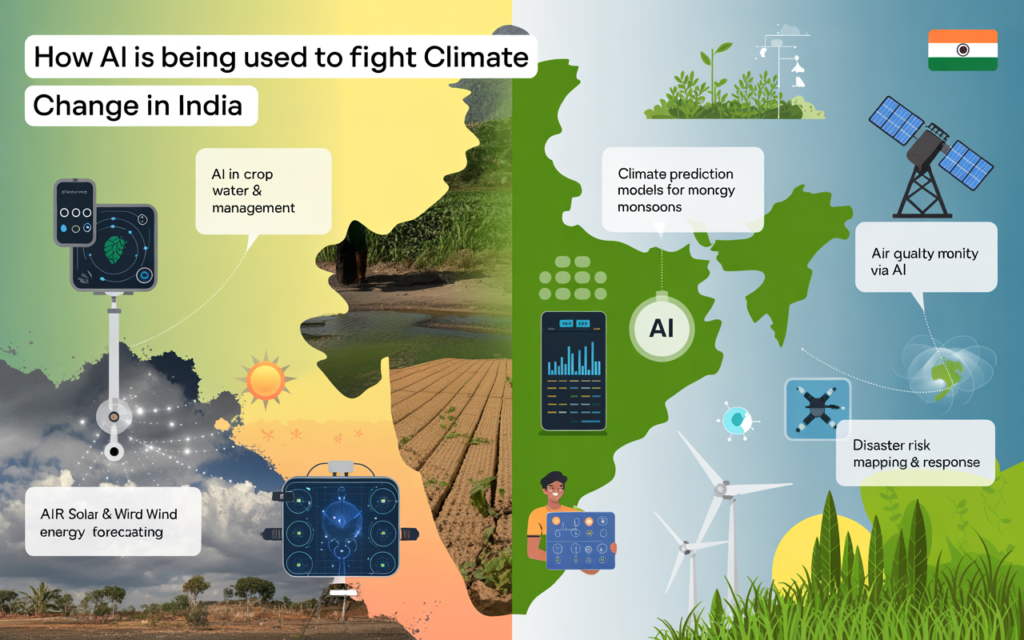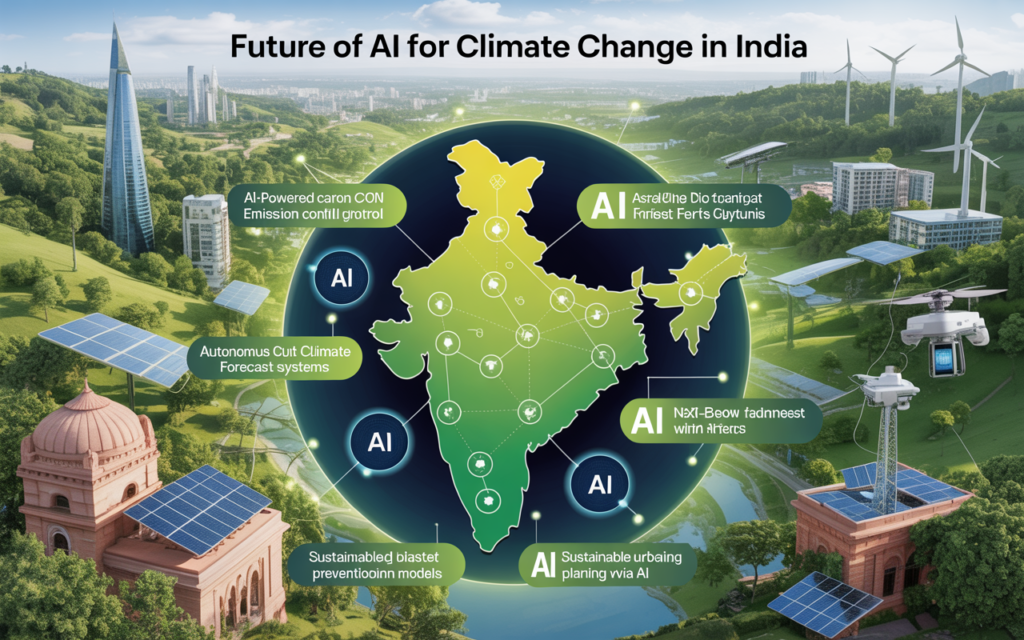Introduction
AI for climate change is revolutionizing how India and the rest of the world tackle environmental issues.. As global warming,, pollution,, and extreme weather events grow more severe,, artificial intelligence (AI) is emerging as a powerful tool to analyze climate data,, reduce emissions,, and build a greener future.. In India,, where environmental concerns affect millions,, AI solutions are being adopted in agriculture,, energy,, and urban planning to support sustainable development.. This article explores how AI is combating climate change,, the role it plays in India’s environmental strategy,, and what lies ahead..
The Urgent Need for Climate Action in India
India ranks among the most climate-vulnerable countries in the world.. Frequent floods,, droughts,, rising temperatures,, and poor air quality affect not just the environment but also public health and economic growth.. According to the Ministry of Earth Sciences,, India experienced a 0..7°C rise in average temperature from 1901 to 2018.. The country also records over 1..2 million deaths annually due to air pollution..
AI provides powerful tools to predict,, manage,, and mitigate these impacts.. Its ability to process massive data sets allows scientists and policymakers to make informed decisions.. With AI,, India can track deforestation,, optimize energy use,, and support farmers facing climate uncertainties..
How AI is Being Used to Fight Climate Change in India

AI is already making a difference in India’s climate action initiatives.. From forecasting air quality to optimizing water resources,, AI applications are becoming more common and accessible..
AI in Air Pollution Monitoring
AI-powered sensors and satellite data help forecast air pollution levels with high accuracy.. Cities like Delhi and Mumbai are using machine learning algorithms to warn residents about air quality.. These forecasts guide government action such as traffic restrictions or school closures..
Smart Agriculture and Climate Resilience
Indian farmers face erratic rainfall,, crop disease,, and temperature shifts due to climate change.. AI tools like Microsoft’s AI Sowing App and IBM’s Watson Decision Platform provide weather-based crop advice.. These tools help farmers reduce losses and choose the best planting times..
Renewable Energy Optimization
AI algorithms help manage the integration of solar and wind energy into India’s power grids.. By predicting energy demand and generation,, AI ensures smoother transitions and reduces fossil fuel dependency..
Disaster Forecasting and Risk Management
AI models now predict floods,, cyclones,, and heatwaves in advance.. The Indian Meteorological Department uses AI to improve early warning systems,, helping communities prepare and evacuate in time..
AI for Climate Change — Key Data Table
| Application | Impact Area | Benefits in India |
| Air Quality Forecasting | Urban Health | Reduces health risks and improves policy response |
| Smart Agriculture | Farming & Food Supply | Increases crop yield,, reduces input waste |
| Renewable Energy Management | Power Sector | Reduces emissions,, lowers costs |
| Disaster Prediction | Disaster Preparedness | Saves lives through early warning |
| Forest Monitoring | Deforestation Control | Helps conservation and carbon capture |
Read more: AI and Data Privacy are becoming increasingly important topics in India as the country rapidly adopts digital technologies.. With government initiatives likes Digital India and the rise of AI-powered platforms, data privacy is now a major concern for both individuals and organizations.. While Artificial Intelligence boosts efficiency and innovation, it often to collects and processes large amounts of personal data.. This raises questions about how to safeguard citizens’ information while still benefit from technological advancements.. In this article, we will explore the challenges, solutions, and future of AI and data privacy in India..
Challenges of Using AI for Environmental Protection in India
While AI holds great promise,, there are several barriers to its widespread use:
Data Accessibility and Infrastructure
India faces gaps in climate data availability and technical infrastructure,, especially in rural areas.. Without reliable data,, AI models cannot function effectively..
Cost and Technical Expertise
Deploying AI-based climate tools requires investment and training.. Many local governments lack the funds and skills to adopt AI..
Ethical and Bias Concerns
AI systems may unintentionally favor wealthy or urban populations,, ignoring the needs of rural and marginalized communities.. Inclusiveness must be ensured in AI development..
Future of AI for Climate Change in India

India is making strong policy moves to integrate AI into environmental strategies.. The National AI Mission and partnerships with global tech firms are pushing innovation.. AI-based climate startups like Blue Sky Analytics are already leading the way in carbon monitoring and environmental intelligence..
As digital infrastructure expands,, AI will become central to India’s green transition.. It can help meet COP28 climate goals,, reduce emissions,, and build climate resilience across all sectors..
How Meri Kahani Supports Awareness and Sustainability
At Meri Kahani,, we believe stories inspire action.. By educating people about the intersection of technology and the environment,, we encourage responsible innovation.. Through informative blogs like this,, we aim to empower Indian citizens to embrace AI for climate change and work toward a cleaner,, safer future..
10 Frequently Asked Questions (FAQs)
1.. What is AI for climate change?
AI for climate change refers to the use of artificial intelligence technologies to analyze,, predict,, and mitigate climate-related issues such as pollution,, temperature rise,, and extreme weather..
2.. How is AI helping India’s climate strategy?
AI is helping India by forecasting air quality,, improving agricultural resilience,, managing renewable energy,, and enhancing disaster preparedness..
3.. Can AI reduce pollution in Indian cities?
Yes,, AI helps track pollution sources,, forecast dangerous levels,, and recommend effective interventions,, especially in cities like Delhi and Kanpur..
4.. Are Indian farmers using AI tools?
Yes,, many Indian farmers are adopting AI-based crop advisory tools to improve yield and reduce climate-related risks..
5.. What role does AI play in disaster management?
AI predicts floods,, cyclones,, and heatwaves,, enabling timely evacuations and relief efforts..
6.. Which Indian organizations use AI for the environment?
Organizations like ISRO,, IMD,, and startups such as Blue Sky Analytics use AI for environmental monitoring and decision-making..
7.. Is AI affordable for environmental use in rural India?
While costs are a challenge,, government programs and NGO support are making AI tools more accessible..
8.. How accurate is AI in climate forecasting?
AI improves accuracy in climate models by processing vast datasets quickly,, often outperforming traditional models..
9.. What are the limitations of AI for climate change in India?
Key limitations include lack of data,, infrastructure,, and skilled professionals in rural regions..
10.. Where can I learn more about AI and environmental protection?
You can visit platforms like UNEP and Meri Kahani to learn more about how AI is being used for sustainability..
Read more: AI tools for small business are transforming the way entrepreneurs operate, especially in India where digital adoption is on the rise.. In 2025, these tools have become smarter, more affordable, and incredibly user-friendly.. From automating customer support to generating content and managing finances, AI is now a necessity, not a luxury.. Indian small businesses, startups, and solopreneurs can now leverage AI to compete with big players efficiently.. This article will explore the best AI tools available today for Indian small business owners, complete with updates, comparisons, and practical tips.
Conclusion
Be Part of the Change Artificial intelligence is proving to be a game-changer in India’s fight against climate change.. From saving crops to saving lives,, its potential is immense.. But technology alone is not enough — awareness,, policy,, and community support are equally important.. At Meri Kahani,, we share real stories of innovation,, hope,, and resilience.. Join us in spreading knowledge and building a better future — because every story has the power to change the world.
